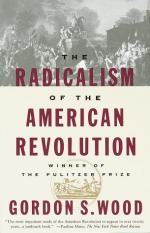
|
| Name: _________________________ | Period: ___________________ |
This test consists of 15 multiple choice questions and 5 short answer questions.
Multiple Choice Questions
1. What did the revolutionaries mean when they said they supported equality?
(a) They supported equal education.
(b) They supported equal income.
(c) They supported equality of opportunity.
(d) They supported equal distribution of wealth.
2. Who said that the secret of America's prosperity was the celebration of work?
(a) Theodore Sedgewick.
(b) Micheal Chevalier.
(c) Edward Everett.
(d) Francis Grund.
3. What eventually became the sole criterion for the political worth of a person?
(a) Loyalty to the administration.
(b) Loyalty to the state.
(c) Loyalty to the people.
(d) Loyalty to the party.
4. Who said that the mind could be cultivated like a garden?
(a) Thomas Paine.
(b) Lord Chesterfield.
(c) John Adams.
(d) Thomas Jefferson.
5. By 1800, what percent of the Philadelphia labor force were indentured servants?
(a) 2%.
(b) 3%.
(c) 4%.
(d) 1%.
6. Who strove to undermine the gentry's distinctiveness and privileges by emphasizing their similarity to common people?
(a) George Warner.
(b) Matthew Lyon.
(c) William Drayton.
(d) Abraham Bishop.
7. Who believed that each individual was responsible for his or her eternal salvation or damnation?
(a) Barton Stone.
(b) Elias Smith.
(c) Lyman Beecher.
(d) Lorenzo Dow.
8. Who wrote "Common Sense"?
(a) Jeremy Belknap.
(b) Robert Munsford.
(c) Samuel Cooper.
(d) Thomas Paine.
9. Before the revolution, what was labor associated with?
(a) Increased productivity.
(b) Slavery and servitude.
(c) Tradition and necessity.
(d) Oppression and fear.
10. What was the population of America in 1810?
(a) 7 million.
(b) 6 million.
(c) 5 million.
(d) 8 million.
11. Who said that "Benevolence is the Cement and Support of . . . the Great Community of mankind"?
(a) Israel Williams.
(b) John Quincy Adams.
(c) James Allen.
(d) Samuel Cooper.
12. Which President said, "Parties would always exist"?
(a) Martin Van Buren.
(b) John Quincy Adams.
(c) James Monroe.
(d) James Madison.
13. What percent of colonial Americans were loyalists?
(a) 15%.
(b) 10%.
(c) 20%.
(d) 5%.
14. In 1800, what percent of the American labor force was in farming?
(a) 75%.
(b) 70%.
(c) 80%.
(d) 85%.
15. In the 1790s, who proclaimed that every man and woman in every society ought to work?
(a) Parson Weems.
(b) Benjamin Rush.
(c) John Adams.
(d) Edward Everett.
Short Answer Questions
1. In the late 1760s, who dismissed people's right to participate in government if they didn't have a liberal arts education?
2. What did Leverett Saltonstall call "the great bond of civil society"?
3. When did Americans begin to call for the boycotting of British goods?
4. Whose play "Cato" taught George Washington what it meant to be liberal and virtuous?
5. In the late 18th century, what replaced whipping and execution as penal codes?
|
This section contains 404 words (approx. 2 pages at 300 words per page) |

|




